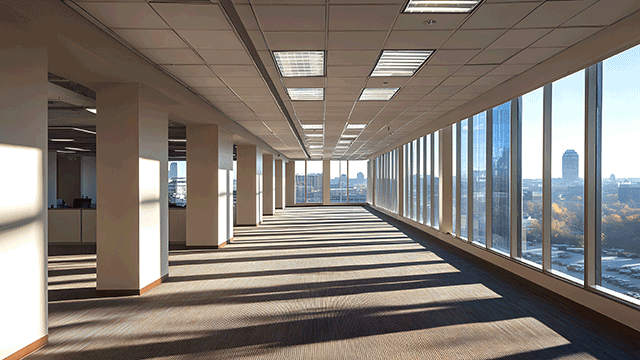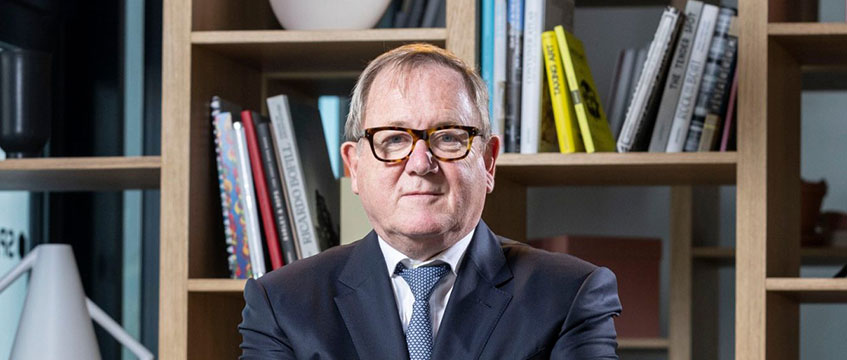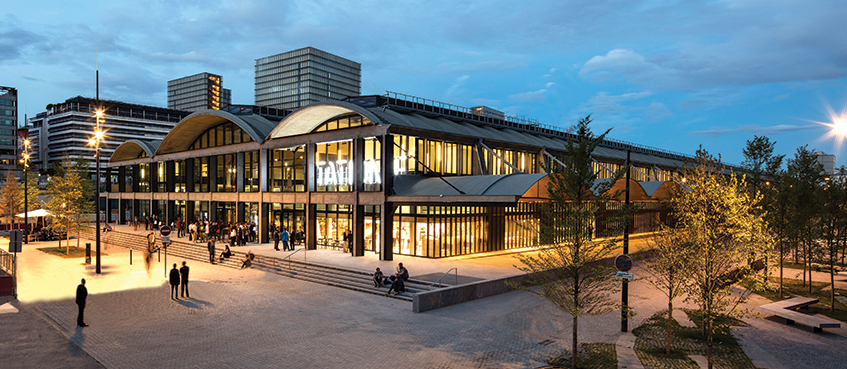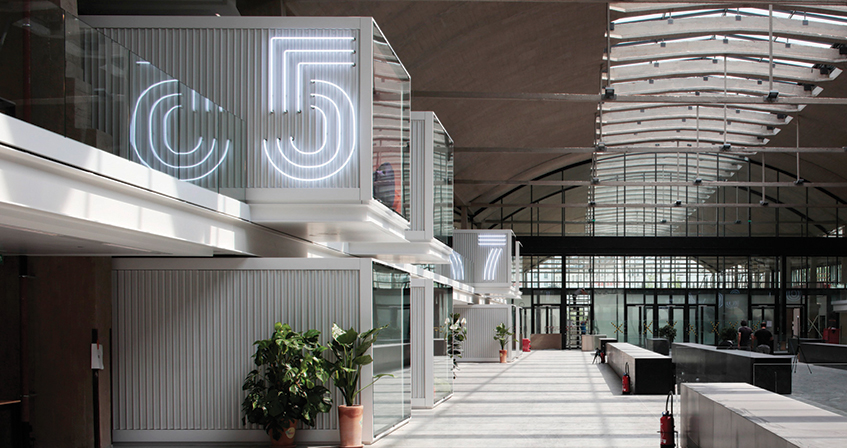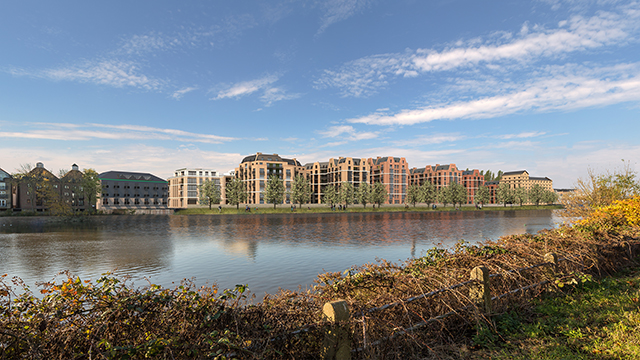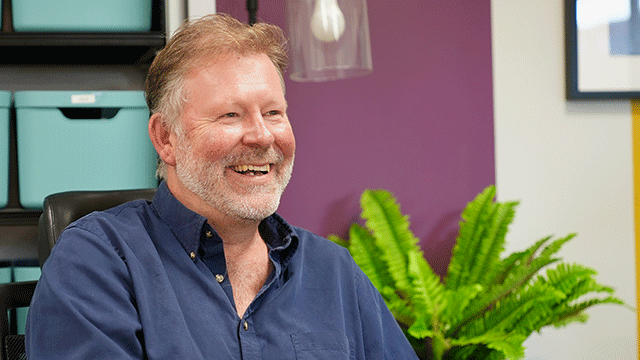When the world’s biggest start-up hub opened in Paris this summer, the French capital’s place on the global tech stage was cemented. Pretty much overnight.
Station F, a vast 34,000 sq ft space in a renovated 1920s freight station, was officially opened by French president Emmanuel Macron.
And while that’s not to be sniffed at, what has really secured the status of this former railway depot in the 13th arrondissement is the attention it has attracted from overseas. Silicon Valley in particular.
Facebook’s chief operating offer Sheryl Sandberg has already visited as part of a tie-up with the campus to incubate data-driven start-ups.
This was followed swiftly by partnership and programme agreements with Airbnb, Microsoft and Amazon as the magnitude of the new hub – which is as long as the Eiffel Tower is tall at 310m and has been designed to house more that 1,000 global start-ups – became apparent.
Our goal with Station F is to not only create the largest start-up campus in the world, but to also create a space that houses an entire start-up ecosystem under one roof
However, this is not so much the story about the launch of the world’s biggest start-up hub, but of the world’s biggest start-up hub being launched in Paris.
A city with a growing tech market, but one that pales in comparison with the likes of San Francisco, New York and its major European rivals of London and Berlin.
The question on everyone’s lips is whether Station F will give Paris a significant but ultimately inconsequential boost in terms of where it sits in the hierarchy of global tech hubs, or could it see the city leapfrog some of its more established rivals?
Lofty goals
Designed by French architect Wilmotte and Associates and backed by entrepreneur and investor Xavier Niel, the team behind this $267m project has ambitions to achieve the latter.
“Our goal with Station F is to not only create the largest start-up campus in the world, but to also create a space that houses an entire start-up ecosystem under one roof,” says campus director Roxanne Varza. “It’s a truly ambitious international project that puts France and Europe at the forefront of the international start-up map.”
The real evidence of confidence in the campus comes through external backing. Facebook has been an early advocate and while it may be invested in Station F’s success as a result of its “Startup Garage” tie-up, where 10-15 data-driven start-ups will be incubated, when Sandberg speaks, people tend to listen.
“Paris has always been a place where people come together to break new ground,” she said while on a tour of the building at the start of the year. “Now it has a thriving tech scene.”
But could it be enough to give Paris the edge over rival European hubs?
“Traditionally, Paris has arguably not been at the forefront of incubating tech talent, with London and other European centres such as Berlin attracting the attention and investment,” says Magali Marton, head of research at Cushman & Wakefield France.
“London has standout locations like Shoreditch and tech giants such as Google choosing to create its start-up campus in the UK capital. Elsewhere, Berlin has its Factory campus – which included set-up investment from Google – and was also host to the first Start-up Europe Summit in 2015.
“London has also led the way globally in terms of creating more of the workspace required by participants in the gig economy and start-ups. Co-working is significantly more established physically and culturally compared to elsewhere, but the tide is changing,” she adds.
“The threat of Brexit and the potential isolating impact on the UK means its dominance as a major hub for tech start-ups could face new challenges from Europe, including France.”
Photos: Patrick Tourneboeuf
The start-up nation
Of course it is not just the launch of Station F that has boosted Paris’s tech credentials. The election of a new, start-up-friendly president is already filtering through, as Macron plans to introduce a raft of start-up-bolstering measure such as cuts in corporation tax and wealth tax exemptions.
Back in June he launched the French Tech Visa – a fast-track four-year residence permit for entrepreneurs and their families – as part of a wider pledge to trasform France into a “start-up nation.”
At the time he said: “We want the pioneers, the innovators, the entrepreneurs of the whole world to come to France and work with us on green technologies, food technologies, artificial intelligence, on all the possible innovation.
“I want France to be a nation that works with and for start-ups, and a nation that thinks and moves like a start-up.”
Station F: the look, the feel, the logistics
Jean-Michel Wilmotte, the architect behind Station F’s design, has retained many of the depot’s original elements, including the pre-stressed, reinforced concrete structure and the old shipping containers, the latter of which have been turned into meeting rooms. The result is a light, open space with an authentic, industrial feel and a nod to the building’s history.
With 3,000 work stations and a building capacity of 9,000, Station F will run more than 20 international programmes and will welcome tenants from around the world.
The campus is divided into three zones: share, create and chill.
The share zone caters for events and social activity and includes a 370-seater auditorium, a brainstorming room and two areas that are open to the public – a co-working coffee shop and an innovation space.
The create zone is where the start-ups will be based, while the chill zone will be based around an Italian restaurant called Mamma F, an outpost of Big Mamma Group, the fastest-growing restaurant company in France.
Entrepreneurs who become part of Station F’s Founders Program can get a desk for €195 per month. Or they can apply for free desk space with the Fighters Program, open to those “who have a killer entrepreneurial mindset and a business with potential, but weren’t born in a privileged environment”.
Station F will also launch a co-living hub for entrepreneurs on Ivry-sur-Seine – 10 minutes away – in 2018. Three towers will house 100 apartments for 600 entrepreneurs at “affordable and flexible” rates.
VC Investment in France. How does it compare?
Venture capitalists invested in 590 French start-ups in 2016, putting the country ahead of Britain, with 520 deals, and Germany, with 380, according to research firm Tech.eu.
It was a record year, with a total of €874m invested in venture capital in France, up 15 per cent from 2015, according to the industry lobby Afic.
And over the first three months of this year, Paris saw 41 venture capital deals for a total value of €235m, compared with 39 deals in Berlin totaling €210m.
En pointe in Paris: How Station F signals a new era for French tech
Magali Marton, head of research – France, Cushman & Wakefield
The election of Emmanuel Macron earlier this year was a significant inflection point for the whole of France.
His ascent to power from virtually nowhere represented a metaphorical crossroads where the alternative could have seen the country head in a very different direction.
Therefore, it was fitting that president Macron – whose movement symbolises inclusivity and who individually personifies a fresh, ambitious approach – should officially open Station F in Paris, which echoes these values, despite the fact this project began three years ago.
Recent announcements on French tech visas and other tax incentives have been designed to encourage the sector.
And now with the opening of Station F, Paris is making its own statement that will be heard around the globe. Not only does its size and scale make it noteworthy, but the timing of its appearance is also striking.
With Donald Trump and Brexit making the US and UK appear more inward-looking, Macron’s election has led to France being seen as a place where collaboration and an outward approach is being nurtured.
Businesses, investors and entrepreneurs who may have previously veered towards the opportunities of London or Silicon Valley can now turn their attention to the French capital.
The creation of Station F demonstrates that funding, talent, resource and government backing have come together to provide an enticing alternative.
This includes not only a place to be but also a pragmatic way to develop tech start-up business with the support of entrepreneurial programmes such as “Founders Program” and “Fighters Program’.
Paris now has the potential to be at the forefront of technology and innovation start-ups in the years to come.
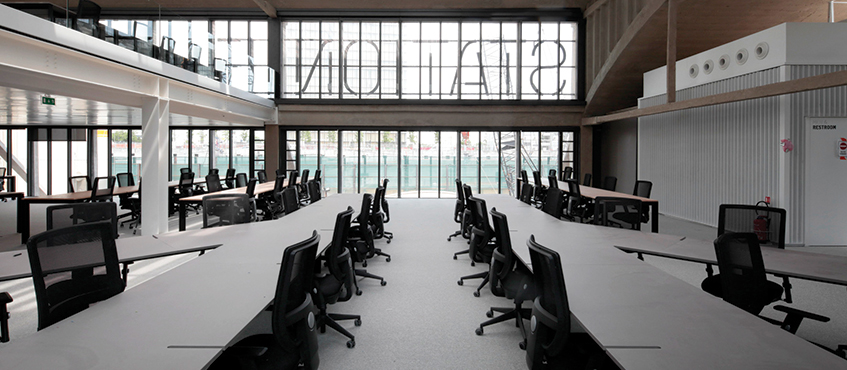
Station F might be the world’s largest start-up hub, but leasing property in France remains a complicated business.
Specific rules apply when renting commercial property or office premises, which should be taken into account when scouting for a location to establish your business. This is particularly important when you are a young company.
Michaël Lévy, real estate partner at Hogan Lovells, Paris, has some tips:
-
Define your needs
It is essential to determine your needs: location, initial size and extension forecast, running costs, duration, etc.
From a legal standpoint, the contract and obligations of the parties differ when renting a property short term versus long term. Therefore, it is crucial to predict the commercial strategy of the company before deciding on the type of lease to enter into.
For example, if you predict that your company’s activity will quickly evolve, your rental need should be flexibility, ie short-term lease agreement or service contract.
If the premises are the perfect fit for your company’s business activity, your rental need should be stability, ie long-term lease agreement.
A standard commercial lease agreement in France is governed by the commercial lease regime (Article L.145-1 et seq of the French Commercial Code), which provides for a specific set of mandatory rules. Pursuant to these rules, the minimum term of a commercial lease is nine years, during which a lessee (and the lessee only) has the right to terminate the lease at the end of every three-year period, subject to a six-month prior notice.
Therefore, this type of agreement is relevant if stability of the premises is the goal.
The Commercial Code authorises the departure from this regime through a short-term agreement. However, this agreement can be restricted in terms of duration (see below). -
Short-term lease (bail dérogatoire)
Choose a short-term lease if you wish to “test out” the premises.
A short-term lease agreement lasts up to three years and is not subject to the mandatory regime of commercial leases.
Within this three-year period the parties may enter into as many agreements as they wish (three months, eight months, two years, etc.) and may provide for termination options at their election.
This is the type of contract to choose if you seek to ensure a maximum amount of flexibility with respect to your real estate strategy. However, if the short-term lease continues (or is renewed) beyond the three-year period, then a commercial lease, subject to the commercial leases regime, will automatically apply. -
Service contract (contrat multiservices)
If the development of your business requires additional flexibility and you are reluctant to enter into a mid- or long-term contract, then try the co-working spaces such as Station F.
Opt for a multi-services contract, which not only provides access to premises or desks, ranging from a few hours to a few days per month, but also the provision of miscellaneous services (internet access, printers, meeting rooms, coffee and even restaurants).
This package may be very useful when you start your business and cannot predict the evolution of your company and need to keep the costs and terms of occupation at a minimum. -
Focus on negotiating what is important
If you are considering entering into a commercial or short-term lease, do not hesitate to negotiate and push for amendments to the landlord. Decide in advance what your deal-breakers are. This way it is easier to concede to some amendments while pushing what is essential to you.
Be particularly attentive to the burden of the works required by the administration clauses (which may oblige you to upgrade the premises up to standards). Have the landlord bear these costs or limit their scope as much as possible by specifying that you will bear the cost of these charges and works only if they relate to your specific activity.
In addition, ask for a free rental period to allow you to undertake the works, capped service charges, or even a rent reduction for the first year of the contract. -
Evaluate your cumulative rental costs
Do not forget to take into account additional costs, such as fitting out, reinstatement, parking or annual increases.
Analyse the total cost of the lease to get a clearer idea of the actual costs that your company will be paying for your new office. This will put you on the right path to picking the best-fitted contract and allow you to negotiate the clauses accordingly.
Click here to read EG’s Tech City guide to Paris.
To send feedback, e-mail emily.wright@egi.co.uk or tweet @EmilyW_9 or @estatesgazette




